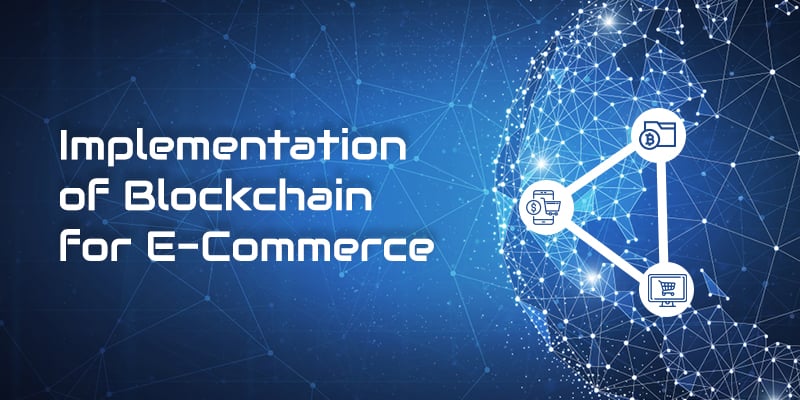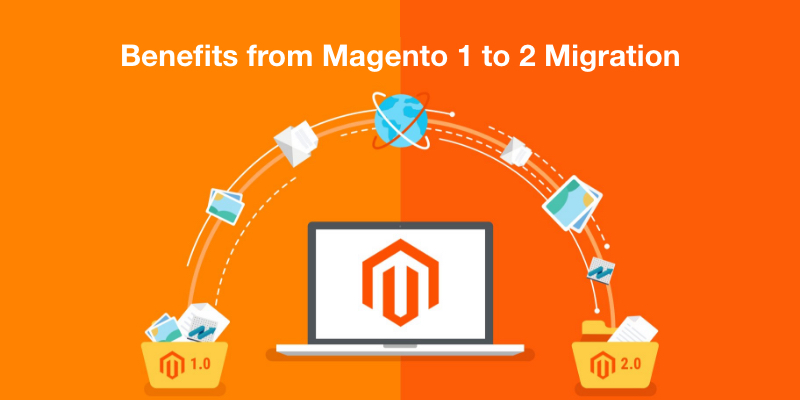Blockchain Implementation for Ecommerce

Futurism Technologies
July 16, 2019 - 5.2K
5 Min Read
What’s next? No sector has faced this question as regularly and as relentlessly as the e-commerce sector. At its core, lies the extra-volatile nature of e-commerce. From voice search to virtual shopping rooms, the world of online selling has seen many breathtaking innovations, and the sector is not done yet.
Once again, it’s on the verge of disruption due to possible use cases of blockchain implementation for e-commerce. It’s hardly a surprise, as blockchain is all set to become the de-facto technology for financial transactions worldwide.
In fact, Statista reports that the global blockchain market is expected to see a surge of more than 400% by 2021. Naturally, it will affect that e-commerce sector, arguably one of the most lucrative sectors of the 21st Century, in more than one way.
Here is how its implementation of blockchain for ecommerce will shape up
1) Payment Methods:

It’s an open secret that payment solutions for international e-commerce are marred with imperfections. Even though it is backed up by payment solutions like PayPal and Skrill, the payment industry has not reached the desired level of networking and accuracy.
Moreover, current payment methods come with high payment processing fees along with the high fees charged by e-commerce platforms. Generally, these fees start from around 2-3% of the total purchase price of any transaction.
Cryptocurrencies were the first implementation of modern blockchain technology, with Bitcoin being a clear leader in popularity and global adoption. As cryptocurrencies are emerging as a credible alternative to traditional currencies, customers can use Bitcoin in much the same way as they would choose to pay with PayPal, Stripe, or any other payment processor.
Apart from being relatively easy to implement, cryptocurrencies are much safer. It stems from its use of peer-to-peer technology, which makes fraud a remote possibility. Note that its non-centrally- driven mechanism ensures that no third party can look over or manipulate your transactions. As identities of the transacting parties don’t get revealed in the blockchain model, transactions maintain greater transparency due to centralized ledger storing.
Clearly, there are enough signs to believe that the first implementation of blockchain in ecommerce marketplace will be in the payment domain.
2) Supply Chain Tracking and Inventory Control:

Supply chain management will top the list of issues that stress the e-commerce entrepreneur. That’s mainly due to the fact that monitoring the supply of goods from the retailer to the e-commerce platform and then again from there to the customer is a tedious task.
The store department needs to assess the stocks that are supposed to arrive and those that are to be delivered. In case, inferior products get supplied, a possibility of fraud arises.
Applying blockchain for e-commerce can eliminate this possibility by allowing the e-commerce platform to track the movement of goods to and fro from its premises. As the recorded data is transparent, any mismatch in the quantity or quality becomes traceable.
Similarly, by the simple addition of smart contracts into the blockchain, e-commerce stores can manage their inventory with more efficiency. It enables them to order the items automatically from the retailer when the pre-defined limit (minimum limit) is reached. Consequently, stores neither have excess products nor they remain out of stock.
3) Security:

The Distributed Ledger Technology or DLT, which blockchain offers, makes it one of the most secure platforms out there. It becomes a natural choice for e-commerce business that handles countless data pieces. That’s why we have seen almost negligible security breaches in blockchain-powered networks.
Another added layer of security comes from blockchain is the fact that blockchain-based currencies don’t reveal personally identifiable information. Currencies like Bitcoin, thus, operate like cash in the sense that they don’t have to expose sensitive data of customers. Customers authorize a transfer from his/her own personal “wallet” to that of the receiver.
A randomly-generated unique identifier is the only individual piece of data tied to each user’s wallet. Indeed, considering the havoc that cyber attacks can cause, adopting blockchain for e-commerce becomes a need.
4) Better Transparent Marketplace:

All major e-commerce players are facing the wrath for being non-transparent in their overall operations. The controversy that happened recently concerned Amazon, where the e-commerce giant disabled the merchant’s page without any explanation and thereby cutting off the merchant’s communication with buyers. Its gravity can be gauged from the fact that President Trump has recently tweeted about Amazon’s transparency concerns.
Blockchain for e-commerce, with its decentralized environment, can become a panacea here. As there is no central control, blockchain can efficiently monitor any wrongdoings by business or merchants.
It’s then not at all surprising that industry bests like Amazon, Alibaba, and eBay have already responded by working on blockchain research. In fact, Walmart and Unilever are working on blockchain projects with tech giant IBM.
In A Nutshell:
There is hardly any doubt that applying blockchain for e-commerce ensures a greater possibility of transparency, reliability, and cost reductions. However, it also underlines imminent threats to the companies which cannot add any value to their customers. With the exclusive benefits of blockchain in e-commerce, as this blog has explained, it now becomes essential for the business to look at it holistically.
Blockchain technology offers more than credible solutions for those vendors who want to include transparency in their business transactions and to manage the consumer data dependably. It also helps in reducing the dependency on paper-based legacy systems. It’s not unfair to say that if e-commerce businesses want to stay efficient and relevant for future customers, then they should start to explore the potential benefits of blockchain technology as soon as possible.
Subscribe Now!
TRENDING POSTS
-
The Role of Smart Maritime IoT Solutions in Enhancing Maritime Safety
-
Data Integration Unlocked: From Silos to Strategy for Competitive Success
-
Navigating the Shadows: Understanding Zero-Click Attacks in the Digital Age
-
AI Reimagined: Crafting Next-Gen AI Apps with Expert Fine-Tuning
-
Explore Next-Gen Digital Solutions with Futurism at MWC 2024
-
Futurism Unleashes the Technology of Tomorrow at MWC Barcelona 2024
-
Futurism AI: Turning Ideas into Apps at Lightning-Fast Speed
-
Accelerate AI Across Your Enterprise With Futurism AI
-
Futurism to Address the Biggest Security Challenges at RSS 2022
-
Futurism at SelectUSA 2022: Steering the Next Wave of Businesses
-
Futurism to Uplift the MSP Business Community at the MSP Expo 2022
-
Futurism Sets Out to Address the Biggest Security Challenges at the RSA Conference 2022
-
5 Ways to Prepare Your Business for Digital Transformation
-
4 Ways To Win at Digital Transformation on a Shoestring Budget
-
Futurism: Empowering MSPs at the Channel Partners Conference & Expo 2022
-
Why AI in Digital Marketing is the Next Big Thing?
-
Futurism brings ‘Mobile First Digital Transformation’ to the fore at MWC Barcelona 2022
-
Cybersecurity for Rural Hospitals: How can Rural Hospitals become Cyber Smart?
-
Futurism Empowers Rural Health Care Community at the AHA Rural Health Care Leadership Conference
-
The Biggest Problem With Cybersecurity In Healthcare Sector, And How IBM QRadar Can Fix It?
-
How IBM MaaS360 is Revolutionizing Endpoint Security in the Healthcare Industry?
-
Futurism to Present its MSP Partner Program at the Channel Partners Conference & Expo 2021
-
EndPoint Security in Healthcare Matters and IBM MaaS360 Can Help
-
How AI Will Enable Faster Adaptation of Digital Transformation
-
How Is Digital Modernization Important In Supplier On-Boarding?
-
Top 10 Email Marketing Tips for This Holiday Season
-
Benefits of using ERP Software for Energy and Gas Industries









